Black Europe on Film: Ten Afropean Movies
By Johny Pitts
Yeah, yeah, I know, you saw ‘La Haine’ and thought it was great. Don’t get me wrong, I thought it was good too. The scene with DJ Cut Killer’s mixing echoing over the white monolithic towerblocks of the banlieue is one of the most iconic moments in European rap history.
For a while, probably during our student years, La Haine was THE cult film to reference for kudos amongst our more socially conscious friends, especially if the issue of black European cinema or French Hip-Hop came up.
But with the elephant in the room now addressed, I thought I’d share a collection of my other favourite films that either star Afropean actors or deal with Afropean themes. For the most part they are contemporary portraits devoid of cool Hip-Hop soundtracks and ghettos (shock horror!). I chose the following films because they are nuanced portraits of the black experience in Europe, or even surreal or metaphysical stories which subtlety suggest a sort of Afropean sensibility. It is by no means a list of the greatest Afropean movies of all time, or definitive or exhaustive in any way. It is more a collection of movies I’ve amassed over the years on my own personal Afropean journey. Stories that caught me off guard at 3am in the morning on Channel 4, or on a midweek afternoon at an independent cinema, or at a screening at a small Afro-Europe related conference somewhere in Europe.
I would LOVE to hear what your favourite Afropean movies are too, so please leave a comment below or E-mail john@afropean.com with any recommendations, and I may well change or expand this list over time. Oh, and if you’re interested in this subject and in Paris on the 13 Feb, there is a study day on the question of exile in African and diaspora cinema. Programme and full info here: http://nle.hypotheses.org/2404 (thank you to Melissa Thackway for the link!)
Lila Says/ Lila dit ça (France 2004)
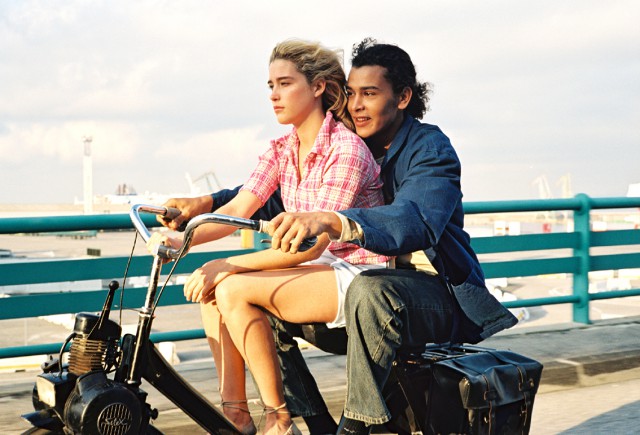
Unlike La Haine, when I mention this piece of Afropean cinema, hardly any one has heard of it. One critic called the movie ‘as sweet as it is dirty’ and it isn’t necessarily a film you’d want to watch with your mum. And yet it is a beautiful piece of film-making about the love affair between a Morrocan boy and a white girl who, as we find out, has her own tale of immigration. It is one of the few films to capture the beauty and poetry of colourful Marseille without a drug dealer or gun fight in sight and the story of how it came to be is astonishing. It is based on a book of the same name, written by an anonymous author under the synonym of ‘Chimo’, who left the manuscript on the door of a publisher, leading many to believe the novel is based on a true story.
White Nights (US/Russia 1985)
Before the rise of the far right and the fall of communism, Russia, or the then Soviet Union, was a fairly black-friendly country, welcoming African students in order to strengthen Cold-War ties with the continent. Filmed in St Petersburg in the 1980s, White Nights is an astonishing action movie, mixing two of the world’s finest dancers in their respective fields; Gregory Hines and Mikhail Baryshnikov, in a tale of exile. It is Dirty Dancing with a dark side – a fun, hammy piece of anti-soviet propaganda the likes of which you have probably never seen before. When the end credits roll, and Lionel Ritchie’s ‘Say You Say Me’ begins (yes, it is the film responsible for the song), you’ll wonder what the hell just happened.
Dirty Pretty Things (United Kingdom 2002)
Probably the most ‘mainstream’ film on this list, and also one that deals in some of the more predictable issues surrounding black life in Europe. I included it because, despite the action and horror and seediness, having lived in London (where the movie is set) for the past ten years, it actually rings true. It is also grossly underrated (well, the critics loved it, but it didn’t seem to get much exposure) and lifts the lid on a city of extreme wealth and extreme poverty. Starring Chiwetel Ejiofor and Audrey Tautou, Dirty Pretty Things delves into the issue of illegal immigration in a way that will change how you look at the topic, and the city of London, forever. (BTW, if you like the movie, I really recommend Sukhdev Sandhu’s book ‘Night Haunts‘, which deals with similar themes )
https://www.youtube.com/watch?v=t7pb2IClEys
Remember Marvin/ Transit Ostende (US/ Belgium 1980)
I wasn’t going to include any documentary films, but Remember Marvin by Richard Olivier is so poetic and allegorical it transcends mere documentary and enters into the realm of dreamy art-scape. It follows Marvin wandering the Belgian seaside town of Ostend like an elegant zombie, battling drug addiction and attempting to get his wayward career back on track. Shot shortly before his death, it captures the genius, insecurity and troubles of one of the greatest musicians of all time, right as he was writing his biggest hit of all, Sexual Healing. Possibly my favourite music documentary.
Wuthering Heights (United Kingdom 2011)
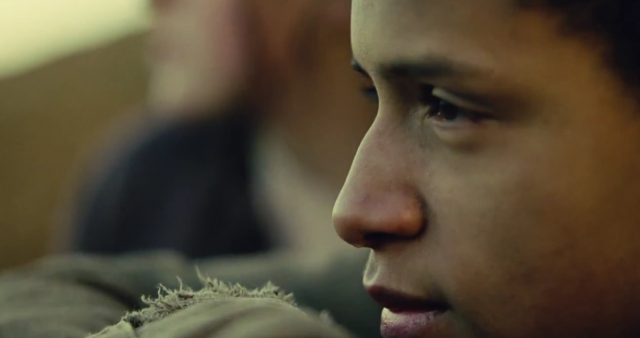
I have a soft spot for this one because the young lead actor playing the role of Heathcliffe is from the same council estate I’m from in Sheffield. The film caused a mini furore at the time, for casting Emily Bronte’s ‘dark stranger’ as a black man, with one reviewer insultingly describing him as a Rio Ferdinand lookalike (we all look the same, apparently). The film uses many first time actors, and also, strangely, has a feel of social realism (if Alan Clarke took on Emily Bronte’s fable, it would have looked like this). Sparse and atmospheric, Andrea Arnold’s Wuthering Heights is a lovely way to spend 90 minutes.
https://www.youtube.com/watch?v=kUWOCd894-Q
JuJu Factory (Belgium 2007)
I saw this film at the recent ‘Afropea Now’ festival in Linz. It came at a timely moment, as I’d just finished reading Adam Hochschild’s haunting ‘King Leopold’s Ghost’, about the King’s murderous rampage through the Congo in the 19th century. It is a metaphysical tale about the burden of blackness when attached to creativity. The lead character, Kongo, is a writer tasked with producing a travel book ‘spiced with exotica’. But through Kongo’s meanderings around the Congolese quarter of Brussels ‘Matonge’, the writer is inspired by ‘the vision of the complex and tormented souls that he meets anywhere, night and day’, much to his publisher’s annoyance. The mood and style of the film reminded me a bit of early Eric Rohmer, and in the director’s own words ‘Juju Factory follows invisible threads connected to Congolese history and its ghosts’.
The Story of a Three Day Pass (France 1968)
A Melvin Van Peebles classic, told with the director’s vintage lightning-sharp wit. It is the tale of Turner, an African American soldier stationed in France. When he’s promoted, Turner gets a few days off, or a ‘three day pass’ and unintentionally finds himself hooking up with a young, white Parisian woman. They plan a romantic getaway to the beach – a beautifully melancholy off-season depiction of Normandy – and begin a romance, clouded by racial prejudice and cultural difference. Originally written in French as a novel by Van Peebles, ‘The Story of A Three Day Pass’ is a clever, mildly surreal tale of the African American presence in France.
Fuck You, Fuck You Very Much (Sweden 1995)
If you thought Sweden was full of polite, democratic blonde-haired, blue-eyed people, all you need to do is watch this brilliant documentary about Swedish Hip-Hop pioneer turned Eurodance singer Leila K and you’ll think again. Of Moroccan-Swedish descent, Leila is what you might describe as an ABSOLUTE G. But this compelling and at times shocking documentary gets behind the bravado to reveal a lonely, insecure performer who seems to be attempting to alienate everyone around her. I couldn’t believe some of the footage the documentary makers managed to get – Leila never has her guard up. She says what she is thinking and insults all of her musical peers… very often whilst she is in their company at various award shows. Then she recoils and hates herself for it. …Fuck You Very Much is a great look at multi-cultural Sweden, and a fickle music industry constantly looking for the next big star, whilst chewing up and spitting out the old ones.
Holland ano paradijs (Holland 2008)
There is that other Dutch-Surinamese film The Price of Sugar with its big budget, cinematic vistas and heart-rending orchestral score all about ‘poor black people’, but just watch Dances With Wolves, or The Help or something and you’ll get the idea. Nope, instead I’m going to include this film I found at a Surinamese market in Bijlmer, Amsterdam a few years ago, made for 15 grand! It is the story of a young Surinamese man, Iwan, who travels to Rotterdam to live with his sister, gets bored and then hooks up with some old pals from back home and finds himself in a spot of bother. It has an amateur feel, and you can see that it was shot on a shoestring, but you learn more about Dutch-Surinamese culture than anything in the nauseating and predictable The Price of Sugar.
The Limits of Control (US/ Spain 2010)
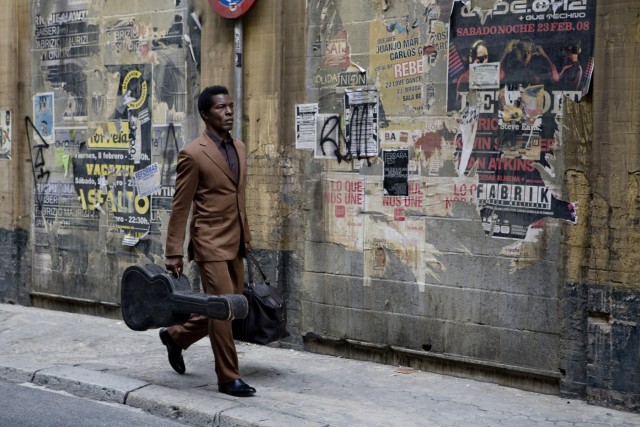
Jim Jarmusch obviously thought he could get away with simply letting his long time collaborator, Isaac de Bankolé, take trains through the Spanish countryside, stopping off to meet beautiful co-stars like Tilda Swinton and Gael Garcia Bernal in picturesque villages along the way. In my opinion, he DID get away with it. Even hardcore Jim Jarmusch fans had their patience tested with this quiet, slow meditation about… well, I’m not exactly sure. Jarmusch himself described the film as ‘an action movie without any action’ and rather than look for a coherent plot, it is better to experience it like a quiet, pleasant train ride. Is it pretentious? Yes! But if there is anybody in the world who can get away with doing something pretentious and still making it worth your while, it is Jim Jarmusch.

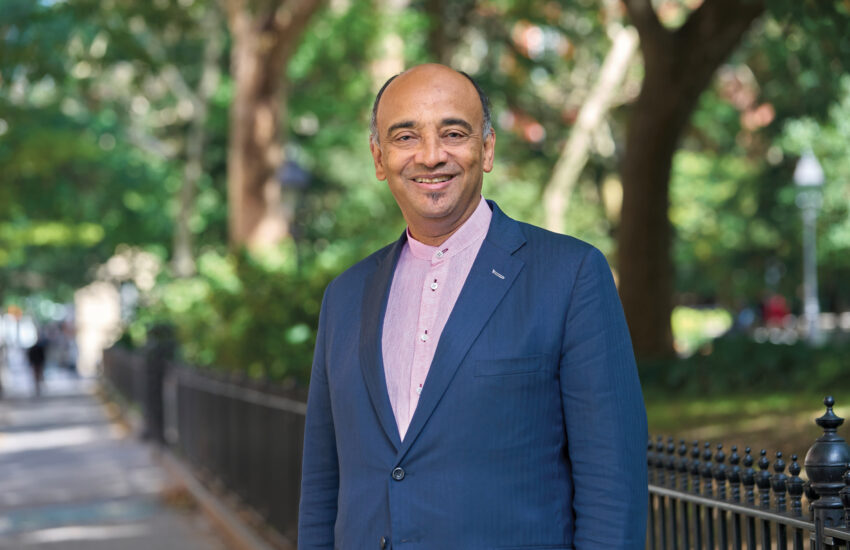
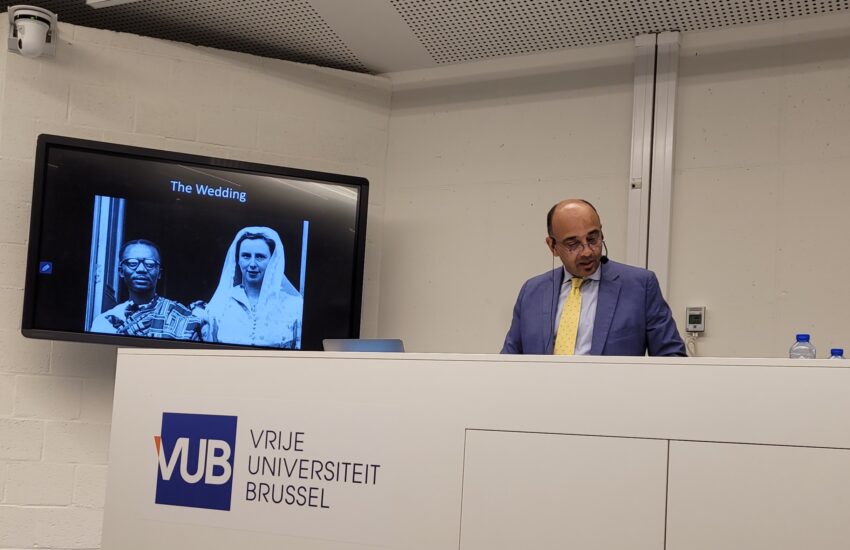
One thought on “Black Europe on Film: Ten Afropean Movies”